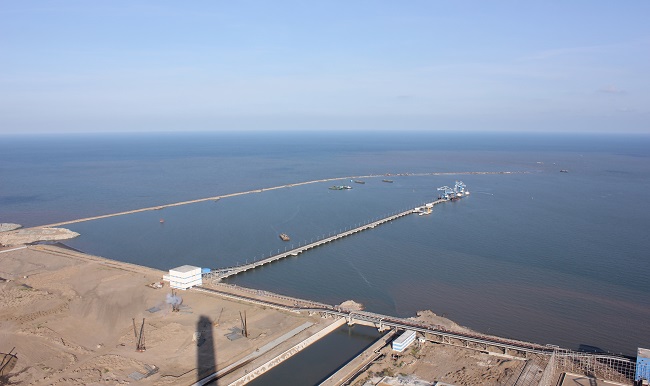Innovative methods facilitate to build seawalls on soft soil


The construction site of the coastal harbor project in Vietnam
The total cost of the coastal harbor project in Vietnam was $199 million, with the construction consisting of a 3.9-kilometer heavy-duty seawall, a 30,000-ton coal terminal, and a 1,000-ton oil terminal.
Due to the construction area being exposed to the open sea, and there being a six-month monsoon period each year with massive waves, construction was incredibly challenging. Additionally, the seabed under the seawall was predominantly made up of soft soil, with the thickest layer of silt reaching 20 meters. Building a seawall on this soft soil is extremely rare in Vietnam and poses many technical challenges.

The construction site of the coastal harbor project in Vietnam
Going back to September 2014, Xu Jiaguo led the technical team to conduct on-site exploration for the first time. The mud layers encountered during drilling had high water content and were highly fluid, which was unfavorable for the implementation of the project. Against this background, Xu Jiaguo started considering innovative methods and detailed technical solutions: filling the mud with the 10-meter thick stones weighing from 10 to 500 kilograms and compressing both sides of the slope with 35 tons of accropode.
Xu’s team, with extensive construction experience, used BIM technology to build a three-dimensional simulation system that could adjust parameters to simulate different ground settlement and wave erosion scenarios. Drawing on the experience of building breakwaters on soft foundations in China, the team has developed key technologies for stone revetment on soft seabed, which have been verified as feasible.
"With the use of new technologies and techniques, the problem of using large stones as fill materials on the soft muddy ground was effortlessly solved," said Xu Jiaguo.
Despite initial construction delays, the breakwater was completed one month ahead of schedule on December 17, 2015.
On January 15, 2016, the project received a commendation letter from Electricity of Vietnam (EVN), praising the project's technical innovation and safe construction.
On May 16, 2018, the project received the final acceptance certificate from the EVN. The key technological innovation of using stone fillings on the soft seabed for the breakwater was awarded the Second Prize of Scientific Progress by the China Communications Construction Company (CCCC). The QC team for the breakwater received the First Prize for the 2015 National Engineering Construction Excellent Quality Management Team.











.png)
.png)
.png)





